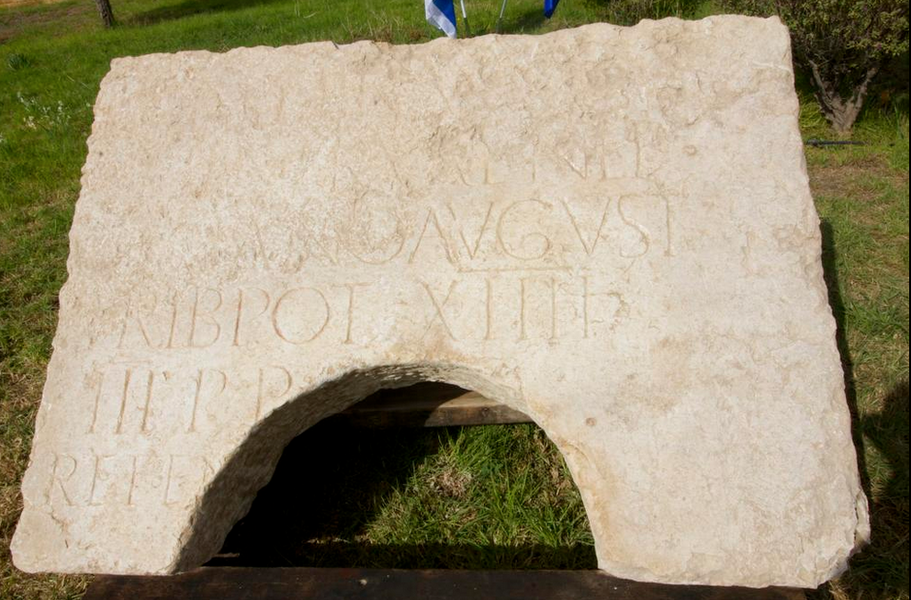Archaeologists discover ancient Roman inscription that could explain mystery of Jewish revolt


A free daily email with the biggest news stories of the day – and the best features from TheWeek.com
You are now subscribed
Your newsletter sign-up was successful
Israeli archaeologists have announced the discovery of a stone with Latin engravings outside Jerusalem's old city. The stone, which was discovered in July and unveiled Tuesday, supports the idea that Jewish people revolted against Rome because the Romans treated them with cruelty.
The Bar Kochba Revolt (also known as the second Jewish revolt) occurred roughly 2,000 years ago, three years after the Roman emperor Hadrian visited Jerusalem in 129 C.E. The Bar Kochba revolt in the second century C.E. is described by Cassius Dio, a Roman historian. The stone suggests that Hadrian's visit is indeed correlated to the revolt: Israel's Antiquities Authority said that the stone's engraving includes Hadrian's name.
Hadrian persecuted the Jewish people during his rule, attempting to force them to abandon Judaism. Historians have long debated the reason for the Jewish revolt, but the inscription suggests that Hadrian's dictates may be to blame.
The Week
Escape your echo chamber. Get the facts behind the news, plus analysis from multiple perspectives.

Sign up for The Week's Free Newsletters
From our morning news briefing to a weekly Good News Newsletter, get the best of The Week delivered directly to your inbox.
From our morning news briefing to a weekly Good News Newsletter, get the best of The Week delivered directly to your inbox.
Israel's Antiquities Authority said that the stone is "among the most important Latin inscriptions ever discovered in Jerusalem," The Jerusalem Post reports. The archaeologists determined that the stone is the other half of an inscription first discovered in the 19th century; the corresponding stone is on display at the Studium Biblicum Franciscanum Museum. The findings about the inscription will be formally presented at a conference Thursday at the Hebrew University of Jerusalem.
A free daily email with the biggest news stories of the day – and the best features from TheWeek.com
Meghan DeMaria is a staff writer at TheWeek.com. She has previously worked for USA Today and Marie Claire.
-
 At least 8 dead in California’s deadliest avalanche
At least 8 dead in California’s deadliest avalancheSpeed Read The avalanche near Lake Tahoe was the deadliest in modern California history and the worst in the US since 1981
-
 Political cartoons for February 19
Political cartoons for February 19Cartoons Thursday’s political cartoons include a suspicious package, a piece of the cake, and more
-
 The Gallivant: style and charm steps from Camber Sands
The Gallivant: style and charm steps from Camber SandsThe Week Recommends Nestled behind the dunes, this luxury hotel is a great place to hunker down and get cosy
-
 Nobody seems surprised Wagner's Prigozhin died under suspicious circumstances
Nobody seems surprised Wagner's Prigozhin died under suspicious circumstancesSpeed Read
-
 Western mountain climbers allegedly left Pakistani porter to die on K2
Western mountain climbers allegedly left Pakistani porter to die on K2Speed Read
-
 'Circular saw blades' divide controversial Rio Grande buoys installed by Texas governor
'Circular saw blades' divide controversial Rio Grande buoys installed by Texas governorSpeed Read
-
 Los Angeles city workers stage 1-day walkout over labor conditions
Los Angeles city workers stage 1-day walkout over labor conditionsSpeed Read
-
 Mega Millions jackpot climbs to an estimated $1.55 billion
Mega Millions jackpot climbs to an estimated $1.55 billionSpeed Read
-
 Bangladesh dealing with worst dengue fever outbreak on record
Bangladesh dealing with worst dengue fever outbreak on recordSpeed Read
-
 Glacial outburst flooding in Juneau destroys homes
Glacial outburst flooding in Juneau destroys homesSpeed Read
-
 Scotland seeking 'monster hunters' to search for fabled Loch Ness creature
Scotland seeking 'monster hunters' to search for fabled Loch Ness creatureSpeed Read
